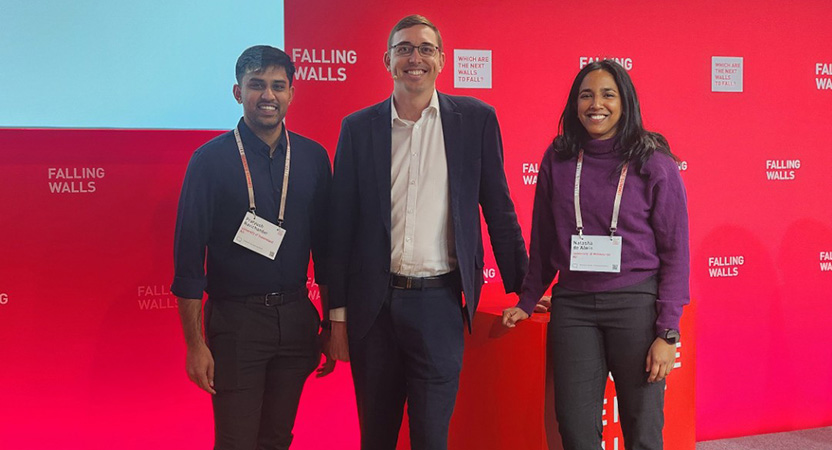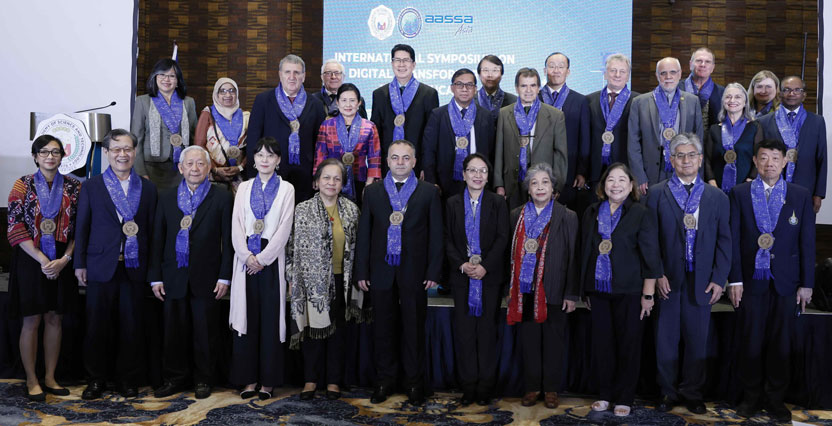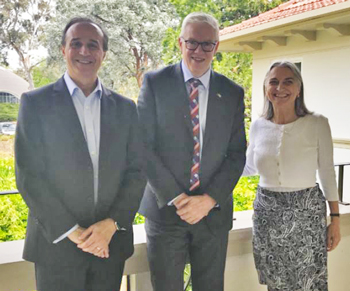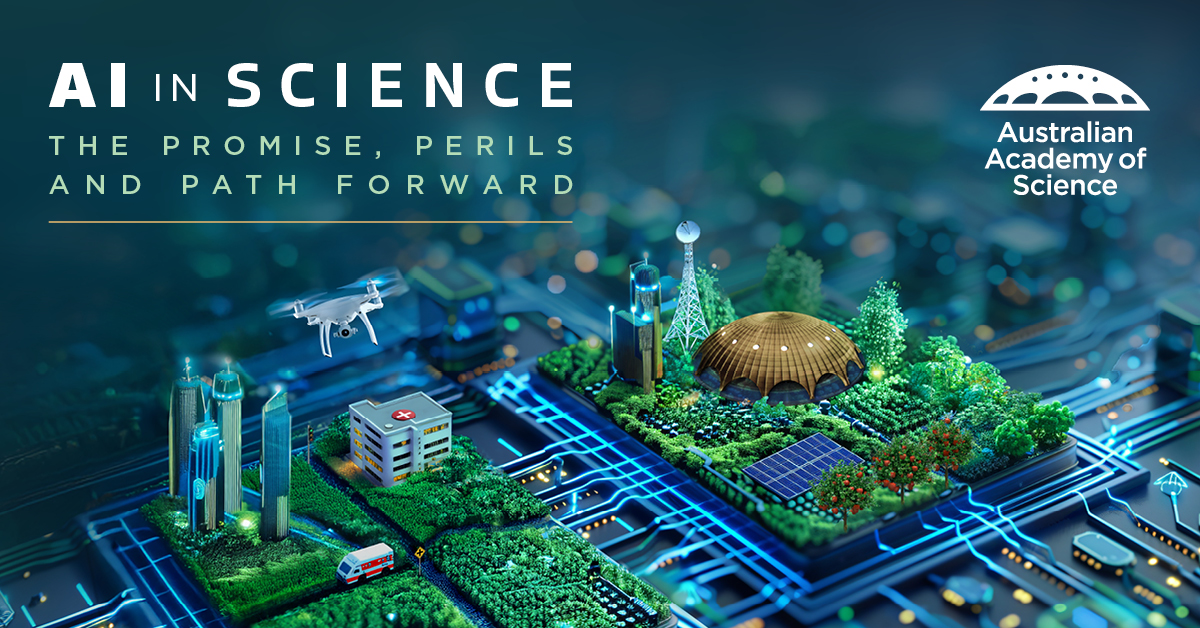

From celebrating the best in Australian science to influencing and advising on national and regional affairs, the Academy played an important role in bringing science to the service of the nation. Highlights of 2024 included the recently announced government review of Australia’s research and development system and the establishment of the Pacific Academy of Sciences.
Find out more about the Academy’s achievements in 2024.

Three early-career researchers from Australia took to the global stage in Berlin in November to pitch their innovative solutions, alongside 97 other young innovators from across the globe, in the Falling Walls Science Summit Emerging Talent category.
Dr Jacob Martin of Curtin University spoke about ‘breaking the wall’ of green graphite; Dr Natasha de Alwis of the University of Melbourne spoke about therapies in pregnancy; and Pratyush Ravichander of the University of Queensland spoke about RNA-based fungicides.
The Academy congratulates them on their success and is pleased to support and empower the next generation of innovators by partnering with the Falling Walls Lab Foundation. Past president of the Academy, Professor Andrew Holmes, was a jury member at the Berlin event.
The Leukaemia Foundation, on behalf of the Blood Cancer Taskforce, partnered with the Australian Academy of Science to develop a 10-year Research Roadmap to accelerate blood cancer research in Australia.
The Academy worked on the roadmap with the Australian Academy of Health and Medical Sciences to identify priority areas for research activity and investment, and barriers and opportunities for research advancement and translation into clinical care.

Academy Foreign Secretary Professor Frances Separovic attended a symposium on digital transformation in healthcare in Manila on 29 and 30 October, jointly organised by the Association of Academies and Societies of Sciences in Asia (AASSA) and the National Academy of Science and Technology, Philippines.
The symposium was also supported by the InterAcademy Partnership (IAP) and the Department of Science and Technology.
This was followed by the AASSA General Assembly, where Professor Separovic was elected a member of the AASSA Executive Board and met with a wide range of scientists from across the region. As well as elections, an activity plan for 2024–25 and a code of conduct for AASSA were endorsed.
AASSA is one of the IAP’s regional networks, whose principal objective is to build a society in Asia and Australasia where science and technology play a major role in the region’s development. AASSA serves as a forum for scientists and technologists to discuss and provide advice on issues related to science, research and development.
On 29 October, the Academy was delighted to host Ambassador for Romania His Excellency Mr Radu Gabriel Safta, and Dr Corneliu Bodea, CEO of Adrem and President of the Romanian Energy Center, for a roundtable discussion on energy.
The Romanian delegation provided an in-depth analysis of the Romanian energy sector and the energy landscape in Europe. Australian delegates, including General Manager of International Science and Resources Branch of the Department of Industry, Science and Resources, Mr Richard Samuels, Lead Scientist of the Climate Change Authority Dr Will Howard, and researchers from the Australian National University, also spoke on Australia’s energy sector and the challenges and opportunities.

On 7 November, the Academy also hosted the Australian Ambassador to Croatia, Mr Richard Rogers. Croatian-born Academy Fellows Professor Frances Separovic and Professor Ivan Marusic discussed their research and the role of the Academy in advancing science and international scientific cooperation for the benefit of the nation.
Also in November, Academy Fellow Dr TJ Higgins was a guest speaker at an International Week of Science and Peace event at the Embassy of the United Arab Emirates. Dr Higgins spoke about the value of science in offering unique avenues for fostering mutual understanding and contributing to global peace and prosperity, using scientific dialogue and evidence as a common language.
The Academy is an active member of the InterAcademy Partnership (IAP) and Foreign Secretary Professor Frances Separovic is a member of the Advisory Committee of the IAP.
On 7 and 8 October, Professor Separovic participated in the IAP Board and Advisory Committee meeting hosted by the Academy of Sciences Malaysia in Kuala Lumpur. The meeting covered matters related to the bids received from relevant IAP member academies interested in hosting the IAP 2025 General Assembly, with the successful bid being awarded to the Academy of Scientific Research and Technology of Egypt.
Other exchanges focused on relationship building with organisations such as the World Health Organization and the Belmont Forum, greater engagement between the IAP Board and its four regional networks, and fundraising and future horizon scanning matters.
At the 11th World Science Forum, held from 20 to 23 November in Budapest, the World Science Forum adopted a declaration on science–policy collaboration.
This was driven by the initiative and commitment of the three founding organisations of the World Science Forum (UNESCO, the International Science Council, and the Hungarian Academy of Sciences) and was the result of scientists issuing an urgent call to action through the adoption of the declaration on the science and policy interface at a time of global transformations.
2025 is the International Year of Quantum Science and Technology, celebrating one hundred years of quantum science and technology. There are many events across the world to celebrate this and inspire the next generation to continue this journey of discovery and innovation.
To kick the year off, the Royal Society is holding a free online conference on 19 and 20 February, on the future of quantum-based computing, networks and sensing systems.
Visit the Australian Institute of Physics’ website for events across Australia.
Dr Petra Lundgren, Director of the International Science Council Regional Focal Point for Asia and the Pacific, is moving to another role in the region. The Academy thanks her for the impact she has made in steering the Regional Focal Point in the two years she has been at the helm, and wishes her well in the new role.
“Highlights for me have been the growing momentum of our Pacific Islands colleagues as they worked towards, and launched, the Pacific Academy of Sciences and elected the 12 eminent Foundation Fellows to lead the Academy forward. This has indeed been an historic development in record time,” Dr Lundgren said.
The Academy will announce the new Director early next year.
The Academy made the following submissions to government:
The NHMRC Biennial Awards celebrate leadership and outstanding contributions to the health and medical research sector. The awards recognise a group or an individual who has made a special contribution in an area of importance to NHMRC. Nominations close 17:00 AEDT Friday 31 January 2025.
Keep abreast of the Academy Fellowship in the Fellows update:
If Fellows have been recognised with an award, please let us know via fellowship@science.org.au so we can consider including it in the next update.

Curious about how artificial intelligence is changing the world around us? Join us in 2025 for six events in our public speaker series to explore the current and future implications of AI. Discover how AI is helping scientists make breakthroughs in health and medicine, climate research, agriculture and food production, space exploration and more. The series will also delve into potential risks, limitations and ethical issues as AI becomes increasingly prominent in science and our society.
The events are held at the Shine Dome in Canberra on the second Tuesday of every second month, and livestreamed online:
11 February
Tuesday 8 April
Tuesday 10 June
Tuesday 12 August
Tuesday 14 October
Tuesday 9 December
Find out more about our 2025 public speaker series
Mark it in your diary: our flagship event, Science at the Shine Dome, is on from 8 to 11 September.
Australia’s science community will again gather at the Shine Dome in Canberra to celebrate science and to honour outstanding achievements in science. 2025’s newly elected Fellows will sign the Charter Book and give short presentations, lectures and presentations will be given by 2025 Academy awardees, the National Symposium will be held to discuss ‘Australian Science, Australia’s Future’, and the networking opportunities will be endless.
Find out more about Science at the Shine Dome 2025
The Academy’s Library and Archives hold one of the most significant histories of Australian science collections in the world, with many thousands of rare and unique items. These intellectual treasures – often hidden behind locked doors – reveal the development of scientific thinking responsible for shaping our modern world. Through meticulous digitisation of archival materials and recording conversations with Australian scientists, we are preserving history whilst providing future generations with access to critical insights and discoveries.
Now in our 70th year, we invite you to support our 2024 appeal to help bring many more of these stories and our collections to life.
Through preserving Australia's scientific legacy your donation will support:
We invite you to read some of our recently digitised material online.
We hope you will consider a gift to support and preserve Australia’s scientific legacy and help us to bring more of our collections and conversations online, for everyone.
To learn more about giving to the Academy visit our website or contact Kate Groves on (02) 6201 9460 or kate.groves@science.org.au.
The Honorary editor of the Academy newsletter is Professor Yuri Estrin FAA
© 2025 Australian Academy of Science